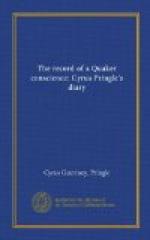Somewhat later President Lincoln wrote again to Eliza P. Gurney requesting her to exercise her freedom to write to him as he felt the need of spiritual help and reinforcement. Her letter of reply so closely touched him and spoke to his condition that he carried it about with him and it was found in his coat pocket at the time of his death, twenty months after it was written. In the autumn of 1864, President Lincoln, still impressed by the message which he had received, wrote a memorable letter to Eliza P. Gurney. It was as follows:
“I have not forgotten—probably never shall forget—the very impressive occasion when yourself and friends visited me on a Sabbath forenoon two years ago. Nor has your kind letter, written nearly a year later, ever been forgotten. In all it has been your purpose to strengthen my reliance on God. I am much indebted to the good Christian people of the country for their constant prayers and consolations; and to no one of them more than to yourself. The purposes of the Almighty are perfect, and must prevail, though we erring mortals may fail to accurately perceive them in advance. We hoped for a happy termination of this terrible war long before this; but God knows best, and has ruled otherwise. We shall yet acknowledge his wisdom, and our own error therein. Meanwhile we must work earnestly in the best lights he gives us, trusting that so working still conduces to the great ends he ordains. Surely he intends some great good to follow this mighty convulsion, which no mortal could make, and no mortal could stay. Your people, the Friends, have had, and are having, a very great trial. On principle and faith opposed to both war and oppression, they can only practically oppose oppression by war. In this dilemma some have chosen one horn and some the other. For those appealing to me on conscientious grounds, I have done, and shall do, the best I could and can, in my own conscience, under my oath to the law. That you believe this I doubt not; and, believing it, I shall still receive for our country and myself your earnest prayers to our Father in heaven.”
It is, then, not surprising that President Lincoln was “moved with sympathy” when he heard the story of Pringle’s suffering for conscience, or that he quietly said to the Secretary of War, “It is my urgent wish that this Friend be released.”
Rufus M. Jones.
Haverford, Pa.,
December, 1917.
FOOTNOTES:
[1] Nicolay and Hay: “Abraham Lincoln,” Vol. VI, p. 328.
[2] Secretary Stanton endeavoured to provide that this commutation money should be made into a fund for the care of freedmen. This suggestion was, however, not adopted by Congress.




